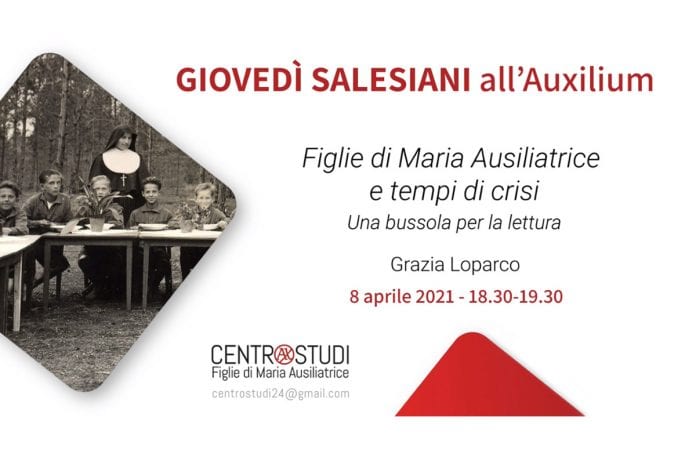Rome (Italy). On 8 April 2021, the cycle of conferences of the Salesian Thursdays at Auxilium, online meetings on issues of pedagogy, spirituality, and history of the Daughters of Mary Help of Christians proposed by the Pontifical Faculty of Educational Sciences “Auxilium” in Rome, Prof. Grazia Loparco, FMA, Professor of Church History in the ‘Auxilium’ Faculty, presented the theme: Daughters of Mary Help of Christians and times of crisis. A compass for reading.
Prof. Loparco proposed a reading journey on the theme ‘giving voice’, through reading testimonies, of some FMA who lived in times of civil, political, and socio-cultural crises, to know how they reacted, while remaining faithful to the educational mandate , “I entrust them to you”. “We listen to witnesses, on the basis of the documentation, to gain strength from their courage and believe that we can still do it today, drawing energy from a charism that is continually incarnated in situations, in concrete people”.
Intending by ‘crisis’ the unforeseen events that destabilize ordinary life, bringing discomfort and uncertainty, or even danger to life, Prof. Lo Parco observed that the beginnings of the FMA Institute were already characterized by the crisis of Christian society and by the emergence of secularization, with the consequent crisis of the traditional model of women and families.
In order to spread human and Christian values and to stem the risks, the FMA knew right from the start with industrious charity, how to give differentiated answers according to needs and environments. In the field of skillful education to form teachers who would prepare future Christians and citizens through formation to work, through festive oratories, catechism, after school care, evening groups for workers, etc. Faced with the crisis of work without protections, the FMA responded by preparing working women through the birth of the Italian Center for Feminine Works (CIOFS).
The great emigration of the early 1900s and the 1st World War urged the FMA to open up to unexpected situations, such as the care of migrants at the port, assistance of the military at the front, presence in military hospitals as nurses, where the Salesian style was comforting. With the Second World War, the commitment of the FMA was also addressed to cities and civilians, in response to widespread poverty: helping displaced persons, orphans, street children, giving refuge to Jews, and those politically persecuted. Mother Linda Lucotti, 4th Superior General of the FMA Institute, encouraged everyone to help, saying: “It is time for charity”.
Prof. Loparco also referred to some testimonies of the FMA of France at the time of the anti-congregation laws in the early 1900s, who while giving up schools, continued with popular and informal works. Spain, during the civil war of the 1930s, continued with the silent and sacrificed work of the FMA up to the heroic donation of Sr. Eusebia Palomino and the two martyrs Sr. Carmen Moreno Benítez and Sr. Maria Amparo Carbonell Muñoz. Also in Mexico, hit by religious persecution especially between 1920 and 1940; of the countries of Eastern Europe at the end of the 2nd World War, with the communist regime; of Mozambique in more recent years, with the nationalization of various religious works.
A common characteristic of the FMA in these times of crisis is the adaptation to secularization, with the renunciation of the visibility of identity, scholastic works, religious habit, but remaining present as educators through the apostolate, and “keeping the fire alive under the ashes”.
The crisis also affects cultural changes in life patterns and behaviors. After the Second World War, with the crisis of values and the departure from religious practice, the FMA responded with the proposal of youth readings, novels and theatrical texts full of educational values, with the magazine Primavera aimed at girls, with text books imbued with Christian principles, with radio and television programs that conveyed an alternative culture.
In more recent times, the crisis of families and associations, the estrangement from the faith, the ecclesial challenges, and the news of the Second Vatican Council, addressed new appeals to educational institutions, asking for a catechetical and pastoral renewal.
Prof. Loparco highlighted how the various crises required from the FMA a discernment that goes beyond the immediate reaction to urgencies and is based on listening to reality and resources, to the Word, to the ecclesial journey, to the lived and transmitted charism. From the various cases evoked, we can see the importance of the formation of the FMA, but also the challenge of ‘learning to learn’ continuously, with flexibility and without losing the values proper to the Salesian charism.
Sr. Grazia Loparco concluded her presentation by saying: “It is the educational passion that sustained so many FMA who sought to adapt to the times that were changing in an unexpected way. Thanks to their ability, the Institute has not only remained present in these countries, but has been able to open up to new frontiers, sometimes precisely because of those difficulties. It is an encouragement to face the challenges of the present and to move forward with hope”.
The appointments of Salesian Thursdays at Auxilium, broadcast live on the YouTube Channel of the FMA Studies Center, encouraged revisiting the identity and charismatic mission of the FMA Institute in light of the educational challenges and current crises, in particular the Covid-19 pandemic.



















Muy interesante, es una iniciativa que ayuda, a estimular al valor, para asumir cada vez más el ardor apostólico propio del carisma salesiano.